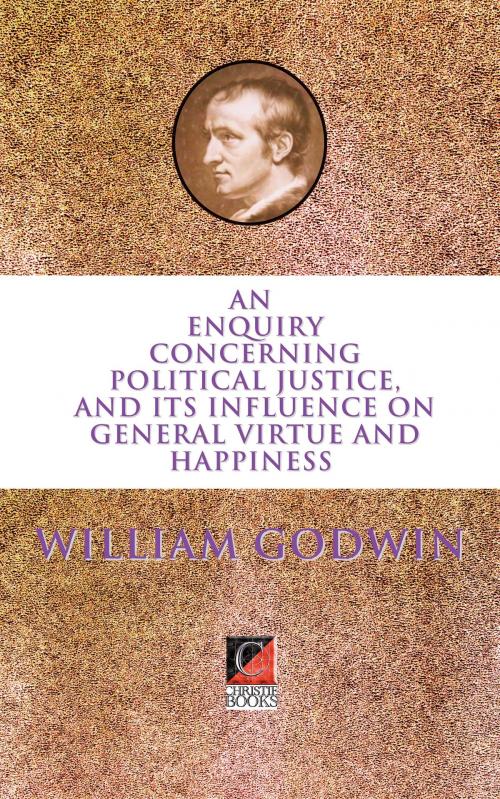AN ENQUIRY CONCERNING POLITICAL JUSTICE
AND ITS INFLUENCE ON GENERAL VIRTUE AND HAPPINESS
Nonfiction, Social & Cultural Studies, Political Science, Government, Communism & Socialism, Democracy, Politics, History & Theory| Author: | William Godwin | ISBN: | 1230000715843 |
| Publisher: | ChristieBooks | Publication: | October 11, 2015 |
| Imprint: | ChristieBooks | Language: | English |
| Author: | William Godwin |
| ISBN: | 1230000715843 |
| Publisher: | ChristieBooks |
| Publication: | October 11, 2015 |
| Imprint: | ChristieBooks |
| Language: | English |
"In 1793, William Godwin, the first philosopher of anarchism, published An Enquiry Concerning Political Justice. This three-volume work gives evidence of being strongly influenced by the ideas of the French Revolution and argues that the rational being, the human, must be given complete freedom to exercise pure reason. All forms of government, being founded on irrational assumptions, are tyrannical and eventually must be eliminated. Laws have been produced not by wisdom but by greed and fear, so they should be replaced by the products of reasonable people’s ability to make decisions. Accumulated property is a means of exploitation and, consequently, must be abolished. This last point was, however, modified in a later edition. With its varying degrees of indebtedness to Aristippus, Plato, Jean-Jacques Rousseau, and Claude-Adrien Helvétius, and despite its equivocating alterations in the final revision, Godwin’s book gave evidence of original thinking and provided generations of revolutionary thinkers with stimulation and guidance.
"Godwin asserts that the general human objective is happiness; that politics, the promotion of individual good, is humanity’s most important pursuit; and that the two traditional articles of political liberty have been, first, “security of our persons,” and, second, “security of our property.” Godwin asks, however, would not a good government “take away all restraints upon the enquiring mind”? The early chapters of the book develop Godwin’s view that throughout history government has had a corrupting influence, but only because people have not lived up to their potential truthfulness and to their ability to see what is evil and what is good. The assumption is that if people will define clearly to themselves the genuinely good principles of life, government will improve.
"Godwin surveys historically the destructiveness and futility of war, and to emphasize its irrational causes, he quotes at some length from the satire on war in book 2 of Jonathan Swift’s Gulliver’s Travels (1726). In the present condition, Godwin continues, punishment is the only means of repressing the violent revolt of the deprived masses. If government is a subject for discussion, however, then people might reasonably agree about it some day and see the advantages of freedom and equality...
"From these premises Godwin proceeds to demonstrate that, of the three principal causes of moral improvement, both literature and education, though beneficial, have limitations, and that the third cause, political justice, is strong where the first two are weak. Political justice is strong in the extent of its operation. When political justice is equally addressed to all, it will impart virtue to all. Since error and injustice tend to destroy themselves, it is doubtful whether they could be perpetuated without governmental support, for government “reverses the genuine propensities of mind, and instead of suffering us to look forward, teaches us to look backward for perfection.” To exemplify how political institutions have in the past militated against moral improvement, Godwin points out the destructive passions engendered by the inequality of property, the magnificence accorded to enormous wealth, and the insolence and usurpation of rich persons. Traditionally, both legislation and administration of the law have favored the rich and have repressed the freedom of the poor to resist the rich..."
"In 1793, William Godwin, the first philosopher of anarchism, published An Enquiry Concerning Political Justice. This three-volume work gives evidence of being strongly influenced by the ideas of the French Revolution and argues that the rational being, the human, must be given complete freedom to exercise pure reason. All forms of government, being founded on irrational assumptions, are tyrannical and eventually must be eliminated. Laws have been produced not by wisdom but by greed and fear, so they should be replaced by the products of reasonable people’s ability to make decisions. Accumulated property is a means of exploitation and, consequently, must be abolished. This last point was, however, modified in a later edition. With its varying degrees of indebtedness to Aristippus, Plato, Jean-Jacques Rousseau, and Claude-Adrien Helvétius, and despite its equivocating alterations in the final revision, Godwin’s book gave evidence of original thinking and provided generations of revolutionary thinkers with stimulation and guidance.
"Godwin asserts that the general human objective is happiness; that politics, the promotion of individual good, is humanity’s most important pursuit; and that the two traditional articles of political liberty have been, first, “security of our persons,” and, second, “security of our property.” Godwin asks, however, would not a good government “take away all restraints upon the enquiring mind”? The early chapters of the book develop Godwin’s view that throughout history government has had a corrupting influence, but only because people have not lived up to their potential truthfulness and to their ability to see what is evil and what is good. The assumption is that if people will define clearly to themselves the genuinely good principles of life, government will improve.
"Godwin surveys historically the destructiveness and futility of war, and to emphasize its irrational causes, he quotes at some length from the satire on war in book 2 of Jonathan Swift’s Gulliver’s Travels (1726). In the present condition, Godwin continues, punishment is the only means of repressing the violent revolt of the deprived masses. If government is a subject for discussion, however, then people might reasonably agree about it some day and see the advantages of freedom and equality...
"From these premises Godwin proceeds to demonstrate that, of the three principal causes of moral improvement, both literature and education, though beneficial, have limitations, and that the third cause, political justice, is strong where the first two are weak. Political justice is strong in the extent of its operation. When political justice is equally addressed to all, it will impart virtue to all. Since error and injustice tend to destroy themselves, it is doubtful whether they could be perpetuated without governmental support, for government “reverses the genuine propensities of mind, and instead of suffering us to look forward, teaches us to look backward for perfection.” To exemplify how political institutions have in the past militated against moral improvement, Godwin points out the destructive passions engendered by the inequality of property, the magnificence accorded to enormous wealth, and the insolence and usurpation of rich persons. Traditionally, both legislation and administration of the law have favored the rich and have repressed the freedom of the poor to resist the rich..."















